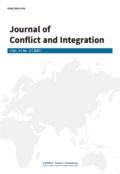Catégorie : Essais
-

Religious network and labor migration: rethinking the integration of low-skilled migrant workers in South Korea
→ L’article en ligne Low-skilled Cambodian workers are not concerned by “multicultural programs” in South Korea. In this context, they deal with this situation through the help of religious institutions, such as the Onnuri Presbyterian Church, by recreating a sort of ethnonational community. Labour migration permits Cambodian workers to weave different kinds of social links between…
-
中国与韩国新儒学视野下“道统”的建立与诠释 (Constructing and Interpreting the Daotong in the Perspective of Chinese and Korean Neo-Confucianism)
Frédéric Wang, rédacteur invité, Zhedong xueshu 浙東學術 (dir. Dong Ping 董平), n°4, 中国与韩国新儒学视野下“道统”的建立与诠释 (Constructing and Interpreting the Daotong in the Perspective of Chinese and Korean Neo-Confucianism), 2020. La revue a repris les actes d’un colloque international « Constructing and Interpreting the Daotong (Transmission of the Way) in the Perspective of Chinese and Korean Neo-Confucianism », coorganisé avec l’Inalco (Frédéric Wang, IFRAE),…